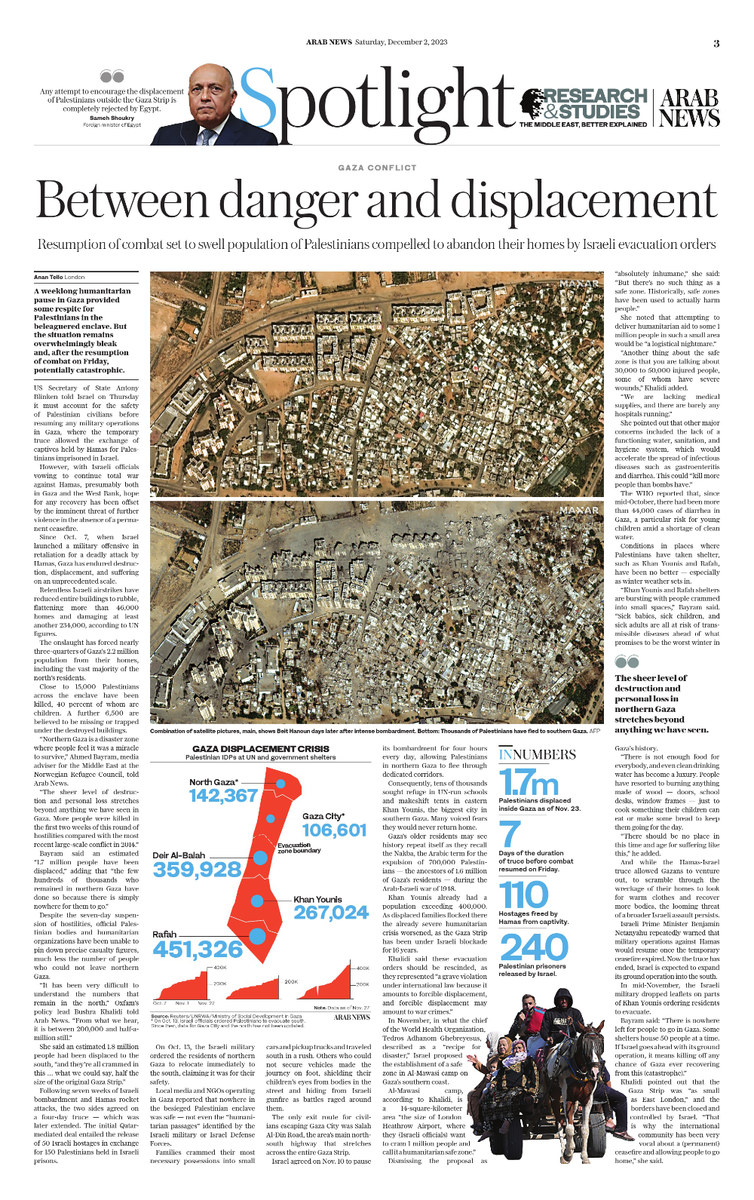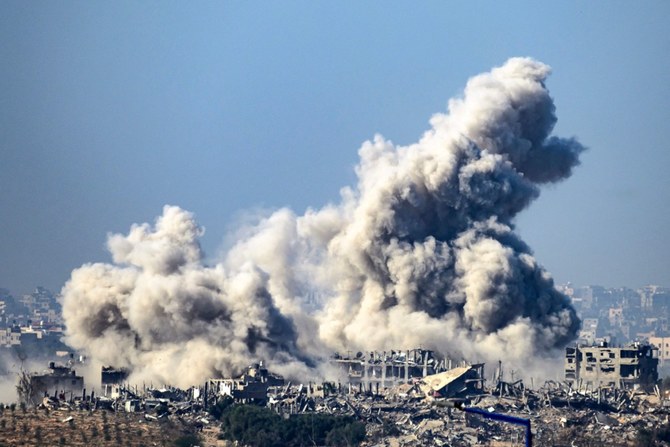LONDON: A weeklong humanitarian pause in Gaza provided some respite for Palestinians in the beleaguered enclave. But the situation remains overwhelmingly bleak and, after the resumption of combat on Friday, potentially catastrophic.
US Secretary of State Antony Blinken told Israel on Thursday it must account for the safety of Palestinian civilians before resuming any military operations in Gaza, where the temporary truce allowed the exchange of captives held by Hamas for Palestinians imprisoned in Israel.
However, with Israeli officials vowing to continue total war against Hamas, presumably both in Gaza and the West Bank, hope for any recovery has been offset by the imminent threat of further violence in the absence of a permanent ceasefire.
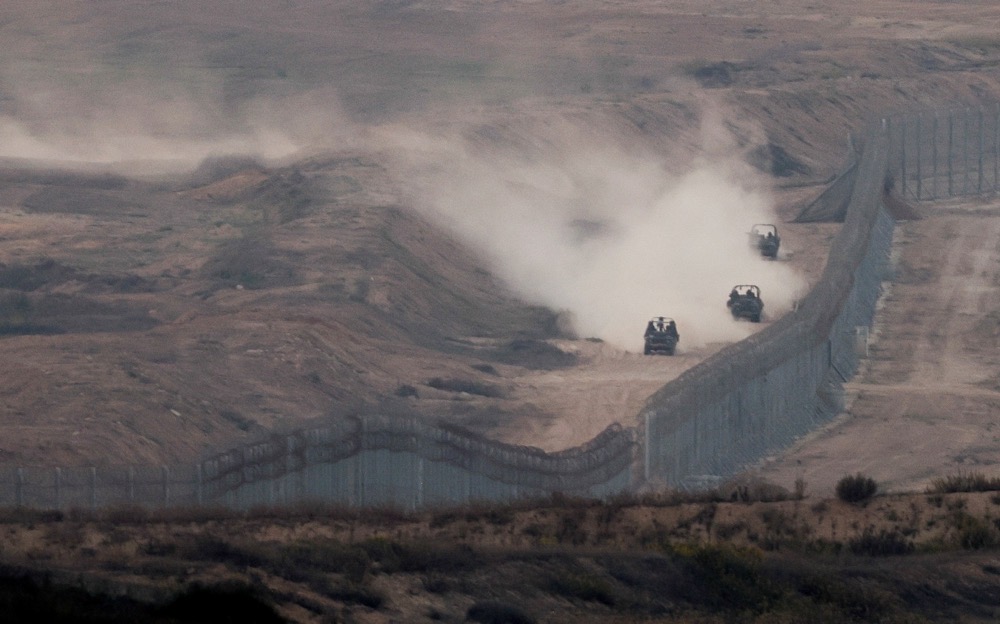
Military vehicles manoeuvre next to a fence, as seen from the Israeli side of the border with Gaza. (Reuters/File)
Since Oct. 7, when Israel launched a military offensive in retaliation for a deadly attack by Hamas, Gaza has endured destruction, displacement, and suffering on an unprecedented scale.
Relentless Israeli airstrikes have reduced entire buildings to rubble, flattening more than 46,000 homes and damaging at least another 234,000, according to UN figures.
The onslaught has forced nearly three-quarters of Gaza’s 2.2 million population from their homes, including the vast majority of the north’s residents.
Close to 15,000 Palestinians across the enclave have been killed, 40 percent of whom are children. A further 6,500 are believed to be missing or trapped under the destroyed buildings.
“Northern Gaza is a disaster zone where people feel it was a miracle to survive,” Ahmed Bayram, media adviser for the Middle East at the Norwegian Refugee Council, told Arab News.
“The sheer level of destruction and personal loss stretches beyond anything we have seen in Gaza. More people were killed in the first two weeks of this round of hostilities compared with the most recent large-scale conflict in 2014.”
INNUMBERS
• 1.7m Palestinians displaced inside Gaza as of Nov. 23.
• 7 Days of the duration of truce before combat resumed on Friday.
• 110 Hostages freed by Hamas from captivity.
• 240 Palestinian prisoners released by Israel.
Bayram said an estimated “1.7 million people have been displaced,” adding that “the few hundreds of thousands who remained in northern Gaza have done so because there is simply nowhere for them to go.”
Despite the seven-day suspension of hostilities, official Palestinian bodies and humanitarian organizations have been unable to pin down precise casualty figures, much less the number of people who could not leave northern Gaza.
“It has been very difficult to understand the numbers that remain in the north,” Oxfam’s policy lead Bushra Khalidi told Arab News. “From what we hear, it is between 200,000 and half-a-million still.”
She said an estimated 1.8 million people had been displaced to the south, “and they’re all crammed in this … what we could say, half the size of the original Gaza Strip.”
Following seven weeks of Israeli bombardment and Hamas rocket attacks, the two sides agreed on a four-day truce — which was later extended. The initial Qatar-mediated deal entailed the release of 50 Israeli hostages in exchange for 150 Palestinians held in Israeli prisons.
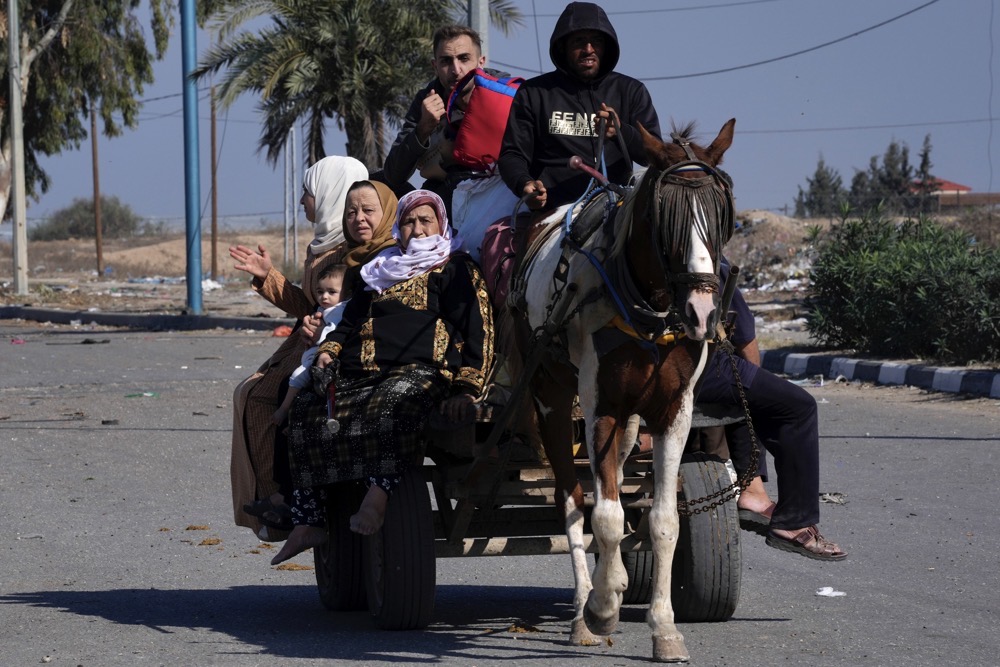
Palestinians flee to the southern Gaza Strip along Salah Al-Din Street. (AP)
On Oct. 13, the Israeli military ordered the residents of northern Gaza to relocate immediately to the south, claiming it was for their safety.
Local media and NGOs operating in Gaza reported that nowhere in the besieged Palestinian enclave was safe — not even the “humanitarian passages” identified by the Israeli military or Israel Defense Forces.
Families crammed their most necessary possessions into small cars and pickup trucks and traveled south in a rush. Others who could not secure vehicles made the journey on foot, shielding their children’s eyes from bodies in the street and hiding from Israeli gunfire as battles raged around them.
The only exit route for civilians escaping Gaza City was Salah Al-Din Road, the area’s main north-south highway that stretches across the entire Gaza Strip.
Israel agreed on Nov. 10 to pause its bombardment for four hours every day, allowing Palestinians in northern Gaza to flee through dedicated corridors.
Consequently, tens of thousands sought refuge in UN-run schools and makeshift tents in eastern Khan Younis, the biggest city in southern Gaza. Many voiced fears they would never return home.

Gaza’s older residents may see history repeat itself as they recall the Nakba, the Arabic term for the expulsion of 700,000 Palestinians — the ancestors of 1.6 million of Gaza’s residents — during the Arab-Israeli war of 1948.
Khan Younis already had a population exceeding 400,000. As displaced families flocked there the already severe humanitarian crisis worsened, as the Gaza Strip has been under Israeli blockade for 16 years.
Khalidi said these evacuation orders should be rescinded, as they represented “a grave violation under international law because it amounts to forcible displacement, and forcible displacement may amount to war crimes.”
In November, in what the chief of the World Health Organization, Tedros Adhanom Ghebreyesus, described as a “recipe for disaster,” Israel proposed the establishment of a safe zone in Al-Mawasi camp on Gaza’s southern coast.
Al-Mawasi camp, according to Khalidi, is a 14-square-kilometer area “the size of London Heathrow Airport, where they (Israeli officials) want to cram 1 million people and call it a humanitarian safe zone.”
Dismissing the proposal as “absolutely inhumane,” she said: “But there’s no such thing as a safe zone. Historically, safe zones have been used to actually harm people.”
She noted that attempting to deliver humanitarian aid to some 1 million people in such a small area would be “a logistical nightmare.”
“Another thing about the safe zone is that you are talking about 30,000 to 50,000 injured people, some of whom have severe wounds,” Khalidi added.

Israeli flares light the sky above Khan Yunis in the southern Gaza Strip. (AFP)
“We are lacking medical supplies, and there are barely any hospitals running.”
She pointed out that other major concerns included the lack of a functioning water, sanitation, and hygiene system, which would accelerate the spread of infectious diseases such as gastroenteritis and diarrhea. This could “kill more people than bombs have.”
The WHO reported that, since mid-October, there had been more than 44,000 cases of diarrhea in Gaza, a particular risk for young children amid a shortage of clean water.
Conditions in places where Palestinians have taken shelter, such as Khan Younis and Rafah, have been no better — especially as winter weather sets in.
“Khan Younis and Rafah shelters are bursting with people crammed into small spaces,” Bayram said. “Sick babies, sick children, and sick adults are all at risk of transmissible diseases ahead of what promises to be the worst winter in Gaza’s history.
“There is not enough food for everybody, and even clean drinking water has become a luxury. People have resorted to burning anything made of wood — doors, school desks, window frames — just to cook something their children can eat or make some bread to keep them going for the day.
“There should be no place in this time and age for suffering like this,” he added.
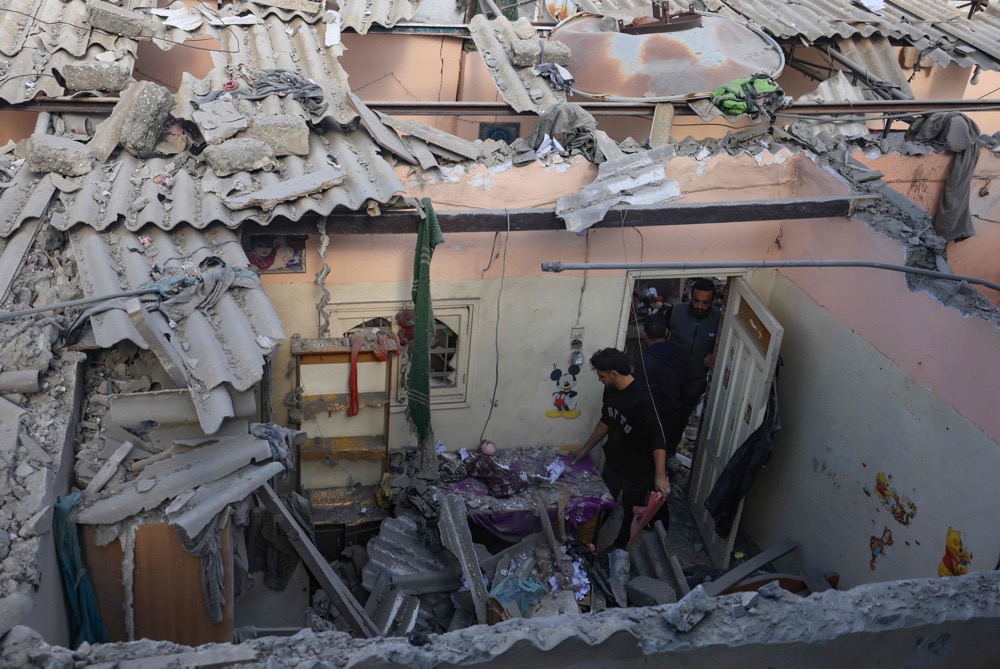
Palestinians check the damage of a house destroyed in an Israeli strike on Khan Yunis in the southern Gaza Strip. (AFP)
And while the Hamas-Israel truce allowed Gazans to venture out, to scramble through the wreckage of their homes to look for warm clothes and recover more bodies, the looming threat of a broader Israeli assault persists.
Israeli Prime Minister Benjamin Netanyahu repeatedly warned that military operations against Hamas would resume once the temporary ceasefire expired. Now the truce has ended, Israel is expected to expand its ground operation into the south.
In mid-November, the Israeli military dropped leaflets on parts of Khan Younis ordering residents to evacuate.
Bayram said: “There is nowhere left for people to go in Gaza. Some shelters house 50 people at a time. If Israel goes ahead with its ground operation, it means killing off any chance of Gaza ever recovering from this (catastrophe).”
Khalidi pointed out that the Gaza Strip was “as small as East London,” and the borders have been closed and controlled by Israel. “That is why the international community has been very vocal about a (permanent) ceasefire and allowing people to go home,” she said.
